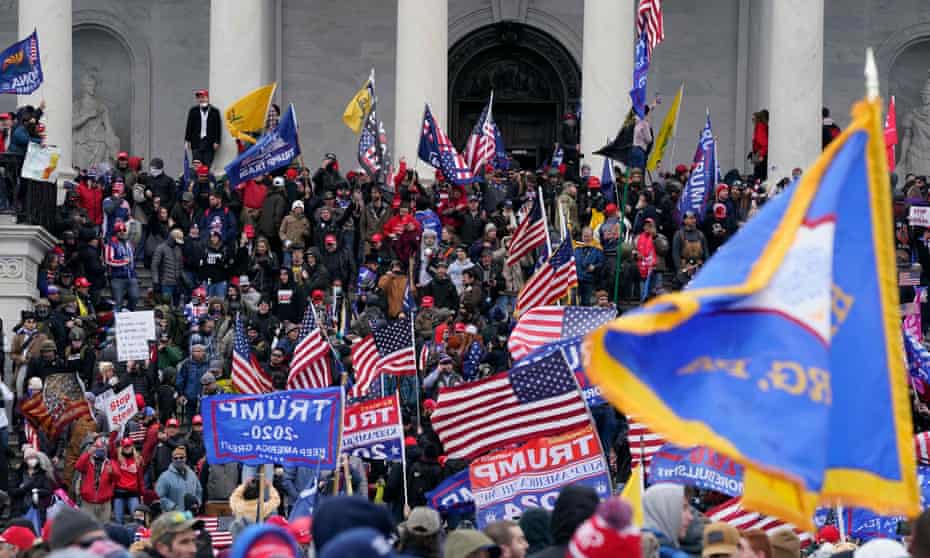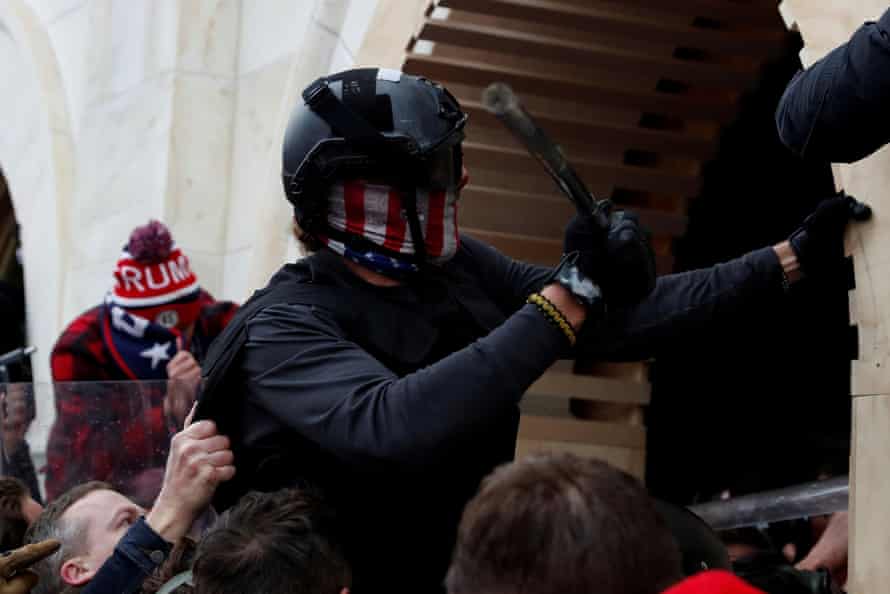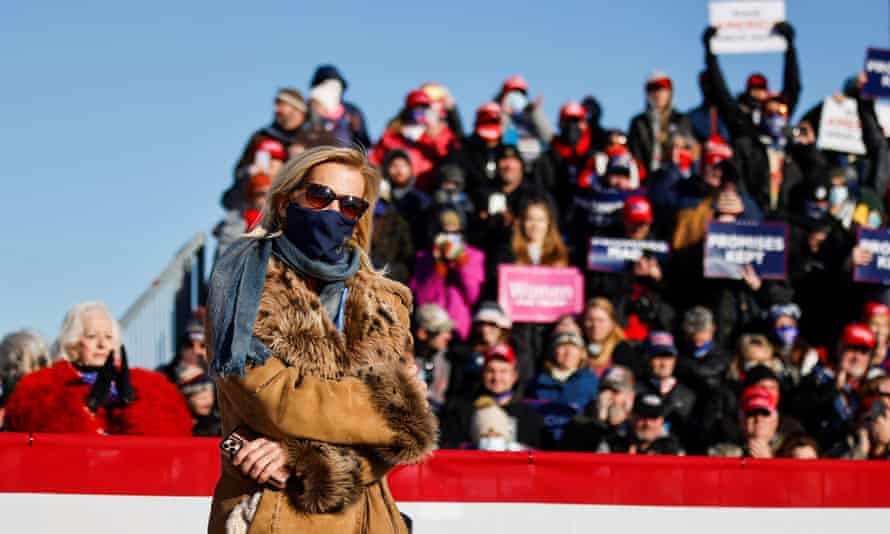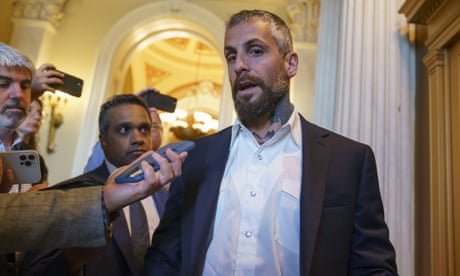Six months on, as politicians and the rightwing media downplay the attack or shift the blame, fears of a replay grow


A mob of Donald Trump supporters stormed the Capitol building to disrupt the confirmation of Joe Biden’s election victory on 6 January 2021. Photograph: Alex Edelman/AFP/Getty Images
David Smith Washington bureau chief
David Smith Washington bureau chief
THE GUARDIAN
Tue 6 Jul 2021
It has been described as America’s darkest day since the terrorist attacks of September 11, 2001. But whereas 9/11 is solemnly memorialised in stone, a concerted effort is under way to airbrush the US Capitol insurrection from history.
Six months on from the mayhem on 6 January, when a mob of Donald Trump supporters stormed the heart of American democracy to disrupt the confirmation of Joe Biden’s election victory, Republicans and rightwing media have variously attempted to downplay the attack or blame it on leftwing infiltrators and the FBI.
Interviews with diehard Trump fans suggest that the riot denialism is working. Many refuse to condemn the insurrectionists who beat police officers, smashed windows and called for then Vice-President Mike Pence to be hanged. The swirl of conspiracy theories, combined with Trump’s deluded claims of a stole election, raise fears of a replay that could be even more violent.
“Rightwing media and some Republicans, including Republicans in the Senate and the House, are trying to make it seem as though what was a siege on the Capitol was not actually a siege on the Capitol,” said Monika McDermott, a political science professor at Fordham University in New York.
“We all saw it. We saw them breaking down doors. We saw our members of Congress running for cover and trying to get away. We saw Mike Pence being shuttled out of the chamber. All of these frightening things that we saw happen are now being denied or being or being laid at the feet of Antifa or the FBI or some other source, which just seems at this point ludicrous.”

Tue 6 Jul 2021
It has been described as America’s darkest day since the terrorist attacks of September 11, 2001. But whereas 9/11 is solemnly memorialised in stone, a concerted effort is under way to airbrush the US Capitol insurrection from history.
Six months on from the mayhem on 6 January, when a mob of Donald Trump supporters stormed the heart of American democracy to disrupt the confirmation of Joe Biden’s election victory, Republicans and rightwing media have variously attempted to downplay the attack or blame it on leftwing infiltrators and the FBI.
Interviews with diehard Trump fans suggest that the riot denialism is working. Many refuse to condemn the insurrectionists who beat police officers, smashed windows and called for then Vice-President Mike Pence to be hanged. The swirl of conspiracy theories, combined with Trump’s deluded claims of a stole election, raise fears of a replay that could be even more violent.
“Rightwing media and some Republicans, including Republicans in the Senate and the House, are trying to make it seem as though what was a siege on the Capitol was not actually a siege on the Capitol,” said Monika McDermott, a political science professor at Fordham University in New York.
“We all saw it. We saw them breaking down doors. We saw our members of Congress running for cover and trying to get away. We saw Mike Pence being shuttled out of the chamber. All of these frightening things that we saw happen are now being denied or being or being laid at the feet of Antifa or the FBI or some other source, which just seems at this point ludicrous.”

Pro-Trump rioters clash with Capitol police on 6 January. Photograph: Shannon Stapleton/Reuters
Hours after the insurrection in Washington, members of Congress returned to the chambers to complete the certification of Biden’s electoral college win. Some Republicans did seem shaken and aware that a new, dangerous line had been crossed. Yet 147 still voted to overturn the election outcome, an ultimately futile gesture.
A month later a minority also voted to impeach and convict Trump for his role in sparking the insurrection, but not enough to stop him being acquitted. Since then, many party members have been eager to “move on” and minimize the events of that day.
Senator Ron Johnson told Fox News: “We’ve seen plenty of video of people in the Capitol, and they weren’t rioting. It doesn’t look like an armed insurrection when you have people that breach the Capitol – and I don’t condone it – but they’re staying within the rope lines in the rotunda. That’s not what armed insurrection would look like.”
Capitol attack: what Pelosi’s select committee is likely to investigate
Read more
Congressman Andrew Clyde – who was photographed barricading the House of Representatives chamber – told a hearing that, based on TV footage, “you would actually think it was a normal tourist visit”. His colleague Louie Gohmert added: “I just want the president to understand. There have been things worse than people without any firearms coming into a building.”
Even Kevin McCarthy, the House minority leader who had said the former president “bears responsibility” for the attack, ultimately bent to Trump’s will and backed the removal of congresswoman Liz Cheney – who was clear-eyed and outspoken about the gravity of the assault – from House leadership.
Advertisement
Mitch McConnell, the Senate minority leader who also condemned Trump’s role in the insurrection, nevertheless ensured that Republicans deployed a procedural rule known as the filibuster to block the creation of a 9/11-style bipartisan commission to investigate it. This was despite the justice department warning that domestic terrorism now poses a bigger threat than attacks from overseas.
Kurt Bardella, a former Republican congressional aide who is now a Democrat, said: “I’m old enough to remember when the Republican party was willing to launch this country into a global war, fought on multiple fronts over the course of many years, because of what happened on September 11. And yet here we are just six months removed from something that happened on our own soil and on our own Capitol and Republicans are actively trying to rewrite history to make it out to be something that it wasn’t.”
Bardella, a contributor to the Los Angeles Times and USA Today newspapers, added: “If those who would deny the gravity of what happened on January 6 achieved a position of power, it is almost a guarantee that this will happen again, only it will be even more violent and more deadly.
“The Republican party is creating a construct in which they are giving permission to their supporters to view any election that doesn’t result in them winning as illegitimate and that is a very dangerous and destabilizing position that will have violent consequences.”
Not for the first time, Republicans are being aided and abetted by rightwing media personalities amplifying their message, not necessarily to change minds but to muddy the waters, leave the events of 6 January open to speculation and give Trump supporters a way to rationalize and justify them.

Hours after the insurrection in Washington, members of Congress returned to the chambers to complete the certification of Biden’s electoral college win. Some Republicans did seem shaken and aware that a new, dangerous line had been crossed. Yet 147 still voted to overturn the election outcome, an ultimately futile gesture.
A month later a minority also voted to impeach and convict Trump for his role in sparking the insurrection, but not enough to stop him being acquitted. Since then, many party members have been eager to “move on” and minimize the events of that day.
Senator Ron Johnson told Fox News: “We’ve seen plenty of video of people in the Capitol, and they weren’t rioting. It doesn’t look like an armed insurrection when you have people that breach the Capitol – and I don’t condone it – but they’re staying within the rope lines in the rotunda. That’s not what armed insurrection would look like.”
Capitol attack: what Pelosi’s select committee is likely to investigate
Read more
Congressman Andrew Clyde – who was photographed barricading the House of Representatives chamber – told a hearing that, based on TV footage, “you would actually think it was a normal tourist visit”. His colleague Louie Gohmert added: “I just want the president to understand. There have been things worse than people without any firearms coming into a building.”
Even Kevin McCarthy, the House minority leader who had said the former president “bears responsibility” for the attack, ultimately bent to Trump’s will and backed the removal of congresswoman Liz Cheney – who was clear-eyed and outspoken about the gravity of the assault – from House leadership.
Advertisement
Mitch McConnell, the Senate minority leader who also condemned Trump’s role in the insurrection, nevertheless ensured that Republicans deployed a procedural rule known as the filibuster to block the creation of a 9/11-style bipartisan commission to investigate it. This was despite the justice department warning that domestic terrorism now poses a bigger threat than attacks from overseas.
Kurt Bardella, a former Republican congressional aide who is now a Democrat, said: “I’m old enough to remember when the Republican party was willing to launch this country into a global war, fought on multiple fronts over the course of many years, because of what happened on September 11. And yet here we are just six months removed from something that happened on our own soil and on our own Capitol and Republicans are actively trying to rewrite history to make it out to be something that it wasn’t.”
Bardella, a contributor to the Los Angeles Times and USA Today newspapers, added: “If those who would deny the gravity of what happened on January 6 achieved a position of power, it is almost a guarantee that this will happen again, only it will be even more violent and more deadly.
“The Republican party is creating a construct in which they are giving permission to their supporters to view any election that doesn’t result in them winning as illegitimate and that is a very dangerous and destabilizing position that will have violent consequences.”
Not for the first time, Republicans are being aided and abetted by rightwing media personalities amplifying their message, not necessarily to change minds but to muddy the waters, leave the events of 6 January open to speculation and give Trump supporters a way to rationalize and justify them.

Laura Ingraham, seen here at a Trump rally last year, said the Capitol attack was ‘not an insurrection’. Photograph: Carlos Barría/Reuters
Conservative television, fringe website and rightwing podcasts are pumping out the propaganda and disinformation. Laura Ingraham, a Fox News host, has told viewers flatly: “It was not an insurrection.”
Her colleague Tucker Carlson, who has a huge following, floated the groundless “false flag” theory that the FBI secretly orchestrated the riot. As he was speaking, a banner appeared on screen that said: “The left wants new information on Jan 6 to go away.”
Chris Hayes, a host on the rival MSNBC network, commented: “The purpose here is not for communicating information. It’s to break the consensus of reality so that people can be manipulated and radicalised. And it is incredibly dangerous. And it is working.”
It is indeed working. Riot denialism was rife at Trump’s first post-presidential rally in Wellington, Ohio, on 26 June, where supporters began from the premise that the election had been stolen.

‘I need a drink’ after Republican talks, says officer beaten in Capitol attack
Gary Sherrill, 65, a concrete mixer driver wearing a “Make America great again” cap, said the insurrection was justified. “They said those people were invading but they own the building. The people inside work for them.”
Rose Kidd, 63, a retired nurse, made the evidence-free claim: “That was all staged. [House speaker Nancy] Pelosi knew. Antifa and BLM [Black Lives Matter] were all bussed in. Video shows it was they who broke the windows. Patriots don’t do that.”
And Gary Bartlett, 65, a retired manual worker at a car manufacturer, added: “99% of the people there were peaceful. The ones who went inside, I don’t know if they were Trump supporters or Antifa who infiltrated. Most of them walked in and walked back out.”
Democrats are working to understand 6 January and ensure it takes it rightful place in the history books. On Wednesday the House passed a resolution to form a select committee to investigate the carnage, with Pelosi appointing eight members and McCarthy appointing five. Many believe that such a reckoning is necessary for a national catharsis and healing – the struggle of memory against forgetting.
McDermott, the political scientist at Fordham, commented: “This was an unprecedented historic event and it is not one that should be wiped off of the history books or hidden away as though it didn’t happen or be minimised in any way. What happened was very real.
“It’s something that the country has to come to terms with, which I don’t see happening right now. We’re in very real danger of forgetting that there is a part of our society that is willing to use violence to get what they want out of the government. And I’ve done polling on this myself and those people are out there. They do think violence is a legitimate way to go and, by giving them cover, this is a very dangerous precedent we’re setting.”
Conservative television, fringe website and rightwing podcasts are pumping out the propaganda and disinformation. Laura Ingraham, a Fox News host, has told viewers flatly: “It was not an insurrection.”
Her colleague Tucker Carlson, who has a huge following, floated the groundless “false flag” theory that the FBI secretly orchestrated the riot. As he was speaking, a banner appeared on screen that said: “The left wants new information on Jan 6 to go away.”
Chris Hayes, a host on the rival MSNBC network, commented: “The purpose here is not for communicating information. It’s to break the consensus of reality so that people can be manipulated and radicalised. And it is incredibly dangerous. And it is working.”
It is indeed working. Riot denialism was rife at Trump’s first post-presidential rally in Wellington, Ohio, on 26 June, where supporters began from the premise that the election had been stolen.

‘I need a drink’ after Republican talks, says officer beaten in Capitol attack
Gary Sherrill, 65, a concrete mixer driver wearing a “Make America great again” cap, said the insurrection was justified. “They said those people were invading but they own the building. The people inside work for them.”
Rose Kidd, 63, a retired nurse, made the evidence-free claim: “That was all staged. [House speaker Nancy] Pelosi knew. Antifa and BLM [Black Lives Matter] were all bussed in. Video shows it was they who broke the windows. Patriots don’t do that.”
And Gary Bartlett, 65, a retired manual worker at a car manufacturer, added: “99% of the people there were peaceful. The ones who went inside, I don’t know if they were Trump supporters or Antifa who infiltrated. Most of them walked in and walked back out.”
Democrats are working to understand 6 January and ensure it takes it rightful place in the history books. On Wednesday the House passed a resolution to form a select committee to investigate the carnage, with Pelosi appointing eight members and McCarthy appointing five. Many believe that such a reckoning is necessary for a national catharsis and healing – the struggle of memory against forgetting.
McDermott, the political scientist at Fordham, commented: “This was an unprecedented historic event and it is not one that should be wiped off of the history books or hidden away as though it didn’t happen or be minimised in any way. What happened was very real.
“It’s something that the country has to come to terms with, which I don’t see happening right now. We’re in very real danger of forgetting that there is a part of our society that is willing to use violence to get what they want out of the government. And I’ve done polling on this myself and those people are out there. They do think violence is a legitimate way to go and, by giving them cover, this is a very dangerous precedent we’re setting.”
No comments:
Post a Comment